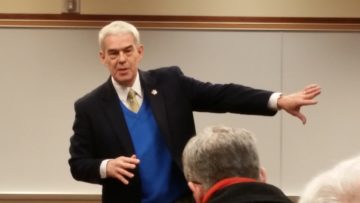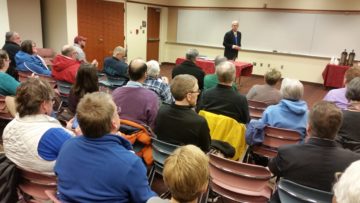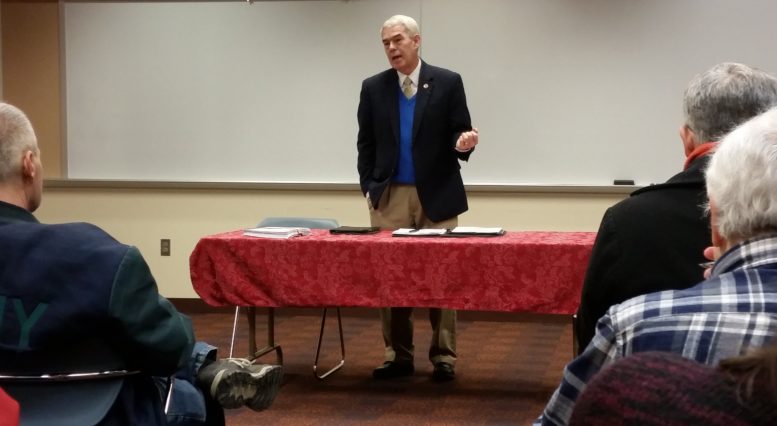By JAN LARSON McLAUGHLIN
BG Independent News
It will be months before State Senator Randy Gardner has to vote on the state budget. That’s why he spent Saturday morning at Wood County District Public Library listening to citizens.
There was a long list of concerns. The room was filled with citizens worried about paying for health care, municipal leaders concerned about taking further funding cuts, and BGSU professors dreading state decisions.
“The budget is many months away from my vote,” said Gardner, R-Bowling Green. So Saturday was part of the senator’s first steps.
“The first responsibility is to listen,” he said.
Gardner said he spent time Friday at a Toledo area hospital with parents of a toddler named Evelyn, who has cystic fibrosis. The state budget includes a provision that will shift the Bureau of Children with Medical Handicaps into the Medicaid program. It’s those kind of personal stories that Gardner said he needs to hear prior to casting a vote.
The 3,512-page state budget is now in House hearings, where it will be voted on in early May. Then it moves to the Senate, where it will face a vote around June 21. Gov. John Kasich will then sign the budget by the end of June, so the fiscal year can start on July 1.
The budget includes “hundreds and hundreds of line items,” Gardner said. He cautioned that the governor has the final say on some by invoking his line item veto power.
“It’s not all about what the legislature puts in. It’s about what the governor can do,” he said.

Gardner answers citizen questions
In response to a question from Bowling Green City Council member Bruce Jeffers, Gardner also explained that even though the Republicans have the majority of the House, the Senate, the governor’s seat and nearly every other state office, that doesn’t mean there is a united front on issues.
“We have a lot of differing opinions of how to move forward,” Gardner said.
Public school funding is always a battle, and is still being debated.
Gardner mentioned Senate Bill 8, which he introduced as a way to help school districts that don’t rank high for the traditional school facilities dollars. Bowling Green City School District is one of those since the perceived wealth of the district makes it unqualified for much building money from the state. While it’s not as much as the school facilities funding, the SB 8 money can be used for technology or security costs, and can be accessed faster by districts.
Other issues brought up at the public forum Saturday included the following.
INCREASE IN SALES TAX, DECREASE IN INCOME TAX
Gardner was asked about Kasich’s proposal to increase the state’s sales tax and decrease its income tax.
“The governor has proposed this a number of times,” he said.
Though the income tax decrease would be even across the board, Gardner agreed with one citizen that the benefits for lower income residents would be negligible.
Gardner said he generally doesn’t support “tax shifting,” and added that “most of the Republican leadership doesn’t agree” with Kasich’s plan.
BUSINESS INCOME TAX COLLECTION
Bowling Green City Council member Sandy Rowland asked about the state’s plan to take over collection of income taxes from businesses. Before sending the tax revenue back to the local communities, state officials have discussed plans to keep 1 percent of the revenue. Municipal Administrator Lori Tretter has already sent a letter expressing Bowling Green’s concerns about the change.
Rowland talked about the loss of state funding in the last few years, “and now comes another potential debacle with city government funding,” she said. “This would pretty much bring Bowling Green to its knees.”
Bowling Green is very fiscally responsible, Rowland said. “We have taken a lot of hits.”
Perrysburg Finance Director David Creps also spoke out against the business income tax change, explaining that local government can handle the issues in their communities more efficiently than Columbus can.
“We can solve these problems instantly,” Creps said.
Though too soon to make any promises – until he has fully studied the issues – Gardner said he couldn’ t envision himself supporting the change in the business income taxes.
“The more you take decisions like that out of the local government,” the less efficient they become, Gardner agreed.

Library meeting room crowded for state budget forum
REQUIRING HIGHER EDUCATION TO PAY FOR TEXTBOOKS
Megan Rancier, an instructor at Bowling Green State University, asked about possible plans for the state share of instruction to increase by 1 percent to higher education, at the same time that universities may be asked to provide textbooks to students. Those costs will be very difficult for higher education to swallow, Rancier said.
Textbook prices have seen “dramatic” increases. “We’ve got to do better,” she said. But the answer isn’t to push the costs onto higher education institutions.
As chair of the Ohio Senate Higher Education Subcommittee, Gardner agreed the costs of textbooks has gotten out of control. He recalled a book his son had to purchase for an accounting class that cost more than $300.
Gardner talked about higher education costs, and explained the need to understand the entire issue. For example, tuition freezes may sound great – but not if they lead a university to reduce course offerings that results in delayed graduations.
“We need a lot of sit down time at the table to make sure we understand the ramifications,” he said.
Gardner added that he expects changes in this higher education proposal before the budget is completed.
MONEY FOR LOCAL GOVERNMENTS
Bowling Green City Council member Bob McOmber asked for assurances from Gardner that no more cuts were planned in the state’s Local Government Funds. The previous cuts are already putting a “considerable strain” on the city, he said.
Gardner explained the reasons for the Local Government Fund cuts. Gov. Ted Strickland was forced to make many cuts when the recession hit. Then when John Kasich took over, there were few areas left to cut other than those funds for local governments.
Those cuts, coupled with the loss of estate tax revenue and lower income tax receipts, have led to the city having 25 to 30 fewer employees, McOmber said.
“We’ve absorbed a lot,” he said.
RETURN OF RIGHT TO WORK LEGISLATION
BGSU professor Marc Simon asked about the possibility of “right to work” legislation being tried again in Ohio.
Gardner offered him comfort, saying “I think the chance of that is close to zero.”
UNCERTAINTIES SURROUNDING THE AFFORDABLE CARE ACT
BGSU professor Andy Schocket asked about the impact on the state of ACA changes such as caps, reductions or block grants.
“We are finding out how challenging it may be,” Gardner said, adding that the uncertainties surrounding the ACA are creating a huge question mark in the state budget.
Barb Ruland asked about the effects if the federal government tries to shift health care management to states.
“Health care is becoming a greater expense for some people than shelter,” Ruland said.
Another woman asked for Gardner’s general stance on health care. Gardner said he believes that earlier, preventive health care is vital, otherwise people turn to emergency rooms.
“I believe that we should provide primary health care services,” he said.
Gardner was then asked about Evelyn – the little girl with cystic fibrosis – whose needs far exceed primary care.
“I’m absolutely committed to making sure that is provided,” he said.
LIBRARY FUNDING FROM THE STATE
Michael Penrod, director of the Wood County District Public Library, noted that while libraries recently saw some “modest” funding gains, the governor’s budget calls for eliminating those gains.
Gardner explained the major cuts suffered by libraries in the last few years, and spoke of his commitment to not see them slashed again.
“I have gravitated to the library cause over the years,” seeing all the services they provide in communities, he said.
MORE QUESTIONS OR COMMENTS
Gardner invited anyone with more questions or comments to send them to gardner@ohiosenate.gov.
“Thank you for having this forum,” Rancier said. “It’s definitely appreciated.”





